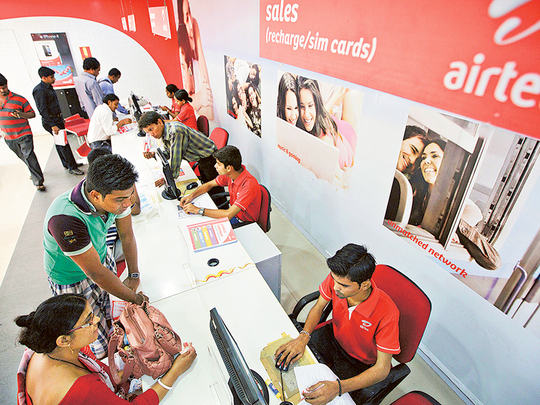
New Delhi Bharti Airtel Ltd’s Chairman Sunil Mittal said India’s richest man Mukesh Ambani is going to shake up the country’s telecommunication industry with the start of a $15 billion (Dh55 billion) fourth-generation wireless service.
The impending entry of Ambani’s Reliance Jio Infocomm Ltd is set to force smaller operators to consolidate, Mittal said in an interview. Bharti Airtel — India’s top wireless carrier — has ramped up investment and is looking for opportunities to purchase spectrum from other companies, he said.
“Whatever Reliance does, it does on a scale that is always big and impactful,” Mittal said on Sunday in the coastal Turkish city of Antalya. “That is exactly what Reliance is planning to do in the telecommunication sector. From what we hear the launch will be imminent in the coming 30, 60, 90 days. India has 10, 11 operators. We should have about four or five at the very most.”
Bharti Airtel is investing $3.5 billion in the year through March, about $750 million more than usual, to spur the company’s 4G plans, Mittal said. Ambani’s Jio is expected to push for faster adoption of the high-speed data technology with competitive pricing. That suggests pressure on profit margins at operators such as Bharti Airtel, Idea Cellular Ltd. and Vodafone Group Plc’s Indian unit in a market of about 900 million active subscribers.
Mergers & acquisitions
Earlier this month, Reliance Communications Ltd — headed by Mukesh’s brother Anil Ambani — agreed to buy AFK Sistema’s Indian wireless unit in an all-stock deal to create a carrier with 118 million subscribers. Mukesh Ambani’s Jio is a unit of Reliance Industries Ltd, which is stepping beyond its traditional oil and gas operations.
Mittal said Bharti Airtel is open to acquiring assets and spectrum.
“But given where we are today as the No. 1 operator in India, our headroom is limited because of certain competition norms and spectrum caps,” he said. “There are some opportunities in the area of acquiring spectrum. That’s the only focus that we have currently.”
Spectrum sharing
Mittal also said Bharti Airtel will approach the government to relax some spectrum sharing guidelines. Indian regulators recently allowed operators to trade airwaves.
“We want deeper sharing,” he said. “We want network sharing, not just spectrum sharing.”
Billionaire Mittal, 58, founded Bharti Enterprises Pvt, which has interests ranging from telecommunications and retail to financial services and solar power. Bharti Airtel is the group’s flagship company.
Bharti Airtel’s shares have declined about 5 per cent this year, compared with a drop of 7 per cent in the S&P BSE Sensex index. The company’s profit of 15.2 billion rupees (Dh844 million) in the three months ended September beat analysts’ estimates, helped by rising data traffic and a one-time gain on the sale of African tower assets.
“Airtel, with its first-mover advantage in 4G services, has had more time to adjust to the market,” said Daljeet Singh Kohli, head of research at IndiaNivesh Securities Pvt in Mumbai. “But with other players also announcing their 4G entry plans and Jio launching, there will be a price war to attract volumes, and that will again disrupt the margins of operators. This will be a fight among the big boys.”
Solar power
Through Bharti Enterprises, Mittal is part of a venture with SoftBank Group Corp’s Masayoshi Son and Foxconn Technology Group’s Terry Gou to invest about $20 billion in solar power in India. The initiative aims to add 20 gigawatts of solar generating capacity.
Solar tariffs fell to a record low for India of 4.63 rupees a kilowatt-hour in recent weeks, prompting concern that some projects won’t get built at such aggressive pricing.
Projects at 5 rupees a kilowatt-hour were “making reasonable sense” because solar panel and infrastructure costs have declined, Mittal said.
“There will be a business case,” he said. “Opportunities to develop businesses around climate change are massive. This could be trillions of dollars of new opportunities that the world today desperately needs to revive global trade.”












